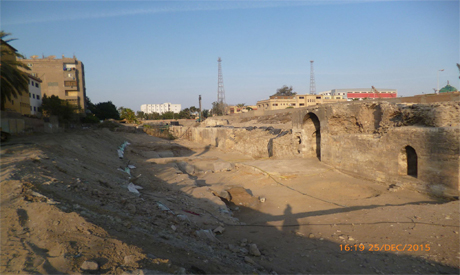
A photo for the Cairo's ancient Eastern wall currently under restoration (Photo:Courtesy Sally Soliman'
Egypt's antiquities ministry has denied allegations by a group of conservation activists that the restoration of part of Cairo's medieval walls is being done unprofessionally and damaging the ancient structures.
Earlier this month, a group of heritage and archaeological activists warned that Cairo's medieval eastern and northern walls were being incorrectly restored and reported the whole matter to the prosecutor-general.
The Antiquities Revolutionaries, a Facebook watchdog group, had published a series photos as well as a leaked memo from a group of inspectors working with the antiquities ministry, detailing how the medieval wall was being badly restored.
"All those claims are lies; they were spread by members of the inspection team who were excluded from the project for incompetence," Mohamed Abdel-Aziz, the head of historical Cairo project and a deputy antiquity minister, told Ahram Online.
"Even the pictures they shared online do not indicate or prove anything. Yes, we use cement for supporting columns, but 50 metres away from the ancient wall," he added.
The dispute comes as another episode in the country’s recent line of restorations that have gone wrong.
The leaked memo sent by a group of archaeological inspectors in the committee assigned by the Ministry of Antiquities to supervise the restoration works in December highlights apparent problems with the restoration.
Among the points raised in the report was how the medieval wall's mud bricks were replaced unnecessarily by new bricks.
The report further states that there had been no plan by the restoration company to secure the old wall's bricks before or during the restoration works, which led to the leaking of cement on the site.
The medieval eastern and northern Cairo walls were built in the 12th century, during the rule of Saladin, then sultan of Egypt and Syria.
Sally Soliman, a cultural and heritage activist, told Ahram Online that she visited the site in late December and took photos showing what she considered clear evidence of the unprofessional restoration that had been carried out there.
"They simply replaced ancient mud brick with bricks and cement unprofessionally," the co-founder of Save Cairo heritage watchdog group said.
She also added that there are concerns about the public sector construction and restoration company that is handling the project.
A total of LE167 million has been allocated by Egypt's Ministry of Housing to restore Cairo's medieval walls. The project is assigned to public sector company Wadi Al-Nil, a construction and restoration company, with the Ministry of Antiquities supervising it.
The company’s previous restoration projects include the Mohamed Ali Palace in Shubra El-Kheima.
In 2012, after six years of restoration, parts of the Mohamed Ali Palace project in Shubra El-Kheima collapsed despite being restored at a cost of LE55 million.
The palace is currently closed after it was further damaged by a bomb that exploded outside Qalioubiya security directorate -- a few blocks away -- in August 2015.
Asked by Ahram Online about the memo leaked online that details the violations in the restoration works, Aziz said that it was leaked by a group of "young, angry and incompetent" inspectors who were excluded from the project.
"They released it the day after they were excluded. Why didn’t they release it before or during the six months that they worked in the committee?" he asked.
According to the leaked internal memo to the minister by the group of inspectors, they did report the violations six months ago as well as four months ago again, to both the Historical Cairo project and the Ministry of Housing.
Short link: